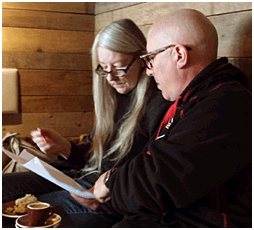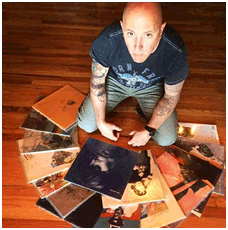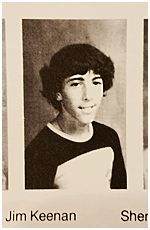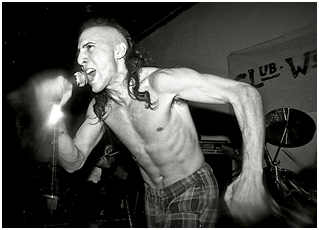|

lire cette interview en FranÁais
Itís Maynard who asked you to write his biography. How did that happen?
Sarah Jensen : I hadnít seen Maynard in a while, and when he came through Boston to do a show, we made plans to get together and catch up. The night before the performance, we
met for dinner at an Indian restaurant in Harvard Square. He looked across the table and asked me if Iíd like to write his biography. Well, I certainly wasnít expecting that! He had
been thinking about a bio for a while, and he decided heíd like someone to write it who actually understood him and where heís from. And thatís important. The little town in
Michigan where he and I are both from is just as much a character in the book as the people.
Did you publish something else before? Was it different or similar for that book?
Iíve been writing for as long as I can remember. Iíve been a journalist, written poetry, and worked for a company that created catalogs and fundraising campaigns for schools and
universities. But this was my first full-length book. Actually, it wasnít much different from the other writing Iíve done. They all involve knowing what you want to say and saying
it well, with all the commas in the right place. This just took a little longer than a haiku.
What was your approach here?
Maynard and I agreed early on that this wouldnít be a typical rock-star biography. It wouldnít be a book about Tool or a tell-all, but the story of Maynardís journey. It hopefully
would show that everyoneís life is a journey, and that the outcomes depend on the choices they make.
Did you meet Maynard for the content, phone him?
Maynard and I live on opposite sides of the country, so every Sunday we got on the phone, and he told me another chapter of his life. During the week, I worked on turning it into a
story. He reviewed everything I wrote, and had final approval over it all.
Were there things more difficult to discuss with him, as there are some sensitive events depicted?
Maynard and I trust each other. That trust meant we could be open and honest with each other. We didnít shy away from talking about sensitive areas, because it was all done to make
the best book we could. Like he says: "If youíre going to do something, you do it. (Ö) You do it for the art."
 
And are there some subjects Maynard directly told you not to talk about?
The only rule we had was that we wouldnít be critical of anyone. A book doesnít have to have villains.
Did you have lots of research to do, and how did you proceed in order to interview all the people?
80% of writing a book is research. When Maynard and I talked, other questions would come up that relatives, friends or his colleagues probably knew the answers to. So I tracked
these people down, interviewed them, and had them fill in details and verify facts. Everyone was very happy to help, and our conversations often led to even more things to research!
I had to look up a million little details too, such as the temperature on a certain date in Boston, the native trees of Oklahoma, and the setlist of the Cinquanta show in 2014.
Google quickly became my best friend.
The non-writing part also included learning how to find an agent, how to read a literary contract, and the ins and outs of copyright law. I canít imagine how biographers accomplished
all this in the past without unlimited long-distance phone plans, digital voice recorders, and the internet!
You must have talked a lot to your brother too, as him and Maynard have been so close.
Kjiirt shared a lot of memories since he had been there for so many of Maynardís pivotal moments. But even more important, he was my support system, always there with an encouraging
word when I felt overwhelmed.
Yourself, when did you first meet Maynard? And what was your first impression then?
I had been hearing about him from Kjiirt ever since they had met in eighth grade in 1979, but I didnít meet him until 1986. The two of them were going clubbing one evening, and
Maynard came to meet him wearing black leather and sporting his Mulhawk; then I remember thinking: "Whoa! I want to get to know this guy!" After that, of course, he became a dear
friend.
You later gave him Little, Big to read, which had a huge impact on him. Can you tell us more about this author and book, and Maynardís
reaction to it?
John Crowley is a Massachusetts author. Itís impossible to describe the book; itís beautifully written, it unfolds like an ever-widening spiral, and itís unlike any other book youíve
ever read. Itís about patterns, destiny, and portals to other dimensions. Thereís even a talking trout, and the fact that he talks isnít shocking or surprising. (really, itís
impossible to explain!) I read it once a year, and discover something new every time. After all, one of its lines is: "The further in you go, the bigger it gets."
I gave Maynard a copy to read when he walked from Massachusetts to Michigan in 1989. The book begins with the main character setting off on a long walk of his own, so I thought
Maynard would be able to relate. It ended up pretty much changing his life.
  
Even if you surely know him well, did you discover more things about him during the writing?
I think the main thing I learned was about his work habits. Maynard is so successful at so many different things. Working on the book with him, I saw first-hand how he focuses on the
task at hand, finishes it to the very best of his ability, and then moves on to another task; and he focuses on that just as completely. It was a good lesson to apply to my own work
process.
Thereís no direct explanation about Maynardís lyrics, which was something that could be expected from him. Instead, there are dots that -by relying
them- form at the end a big picture about him and his art(s), which is really interesting.
The book is full of what Maynard and I call 'breadcrumbs'. If you read slowly and closely, youíll notice them: little hints that add up to larger ideas. Lyrics might not be written
out word-for-word, but take your time when you read about things that happened in his youth, for example, and youíll have reached that moment where you say: "Oh! So thatís where the
image in that Puscifer song comes from!" The whole book is constructed as a puzzle that you can have fun putting together. (the title is a puzzle too!)
I was also surprised by all the details of everyday life, which brings the reader to immerse into the book like in a novel.
Thatís a good way to put it. Yes, we wanted the book to be a story, not just: "He did this, and then he did that." Maynardís biggest influences -John Crowley, Joseph Campbell- are
storytellers. The magic of stories is that readers can make them own, and not just read them like a collection of facts.
How long did he take finally for the book to be done and published?
It was about 3 1/2 years from the day I started writing until publication day. A lot of that time was taken up with editing and proofreading. I think I read the finished manuscript
6 times before I felt confident enough to let it go to press. Itís so easy to miss typos and misspellings, and after you read something that many times, you donít even see the errors
any more. My friend Stuart volunteered to read it also, and he caught some mistakes that would have been very embarrassing had they not been found!
And how was the reception? Are there some things you would have done differently in retrospect?
Writers need to develop a thick skin before they look at reader reviews. Some of them can be quite brutal. But I take a deep breath and go to Amazon with the attitude that there are
things I can learn from the most scathing review. Fortunately, many people have said positive things. The book also got great reviews from Publishers Weekly and Library
Journal, and debuted at #10 on the New York Times best-seller list, so it turned out better than we ever dreamed!
This was such a fabulous experience, and I wouldnít trade those years of constant work for anything. The only thing I would do differently is hire a housekeeper. Writing a book is
the very hard work, and very intense. It doesnít leave much time for cooking, and you hate to break the spell to scrub the kitchen floor!
|